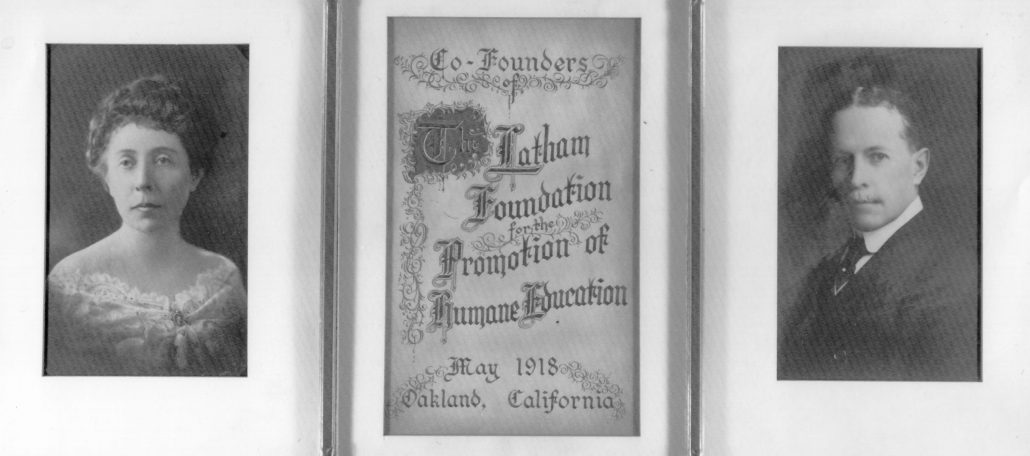Latham’s Early History
We are indebted to the late Elliot Evans, Ph.D., former Latham Foundation Director and Curator Emeritus of the Society of California Pioneers, for the following biographical information on Edith.
Edith Latham was born in Virginia City, Nevada in 1866 where her father, James H. Latham, was the Wells Fargo representative. He moved the family to San Francisco in 1869 and soon ensconced himself in a highly successful brokerage firm. He established his family in a handsome residence in Oakland where his small red-headed daughter was provided with every luxury. For example, Edith had a fabulous playhouse which, although it was the envy of her contemporaries, was disregarded in favor of the horses, dogs, and cats in and about the family stable. Edith’s mother was a beautiful and gifted lady much given to intellectual pursuits and devoted to the education of her three children. Edith’s father died in 1876 at the age of 42, leaving a considerable inheritance.
The Lathams subsequently lived rather retired lives following their own interests with amazing intensity, “always studying something.” At one time, about 1890, the family became vegetarian, an early example of their concern for animals and protested against the barbarous slaughtering practice of the time. Mrs. Latham even published a vegetarian cookbook. She died in Paris in 1909.
Edith and her brother were both unmarried and both gravely distressed by their mother’s death. They moved to New York State and by the beginning of the First World War, began to consider what to do with their rather substantial means. Humanitarian ideas seemed to have loomed large in their contemplative lives and one thought was the possibility of endowing a nursing home in New York State. But this failed to materialize and Edith and Milton returned to California, this time to Hollywood. There they saw animals exploited, neglected, and mistreated and the animals’ sorry plight attracted their sympathetic attention.
Recalling their childhood and the kind care their own pets had received, Edith and Milton conceived of teaching respect of pets and of all living creatures. Thus, the Latham Foundation for the Promotion of Humane Education came to be established. Two highly educated and kindness-oriented individuals determined to devote their fortune and the remainder of their lives to help those who could not speak for themselves. With impressive vision and foresight, Edith and Milton founded the Latham Foundation in 1918.

In 1921 Milton died leaving Edith to carry on their project alone. This she did with energy and steadfastness for over 30 years. She personally explored many methods of reaching the largest possible number of children with her humane message.
Her first efforts to attract support were modest. Efforts to gain access to schools with her humane message made a slow start.
Attempts to influence legislation were tried and abandoned in the middle 1920s, even though the causes were good in themselves. Miss Latham rather quickly saw that humane societies and other direct action groups found these activities in their province.
However, by 1927 work in the Oakland public schools was gratifying. She enlisted talented children’s authors such as Gwyn J. Tebault and Dolores Wilkens Kent to help promote her message and she gained the cooperation of school administrators and classroom teachers. Progress was encouraging. The Kind Deeds Club and the Kind Deed Messenger (a school newsletter) along with a radio program using Mrs. Kent’s stories prospered. An essay contest further expanded the audience for Miss Latham’s message of kindness. Click here to see samples of the Kind Deed Messenger.
In 1928 the international poster competition was born thanks in large part to a gifted couple Mr. and Mrs. John de Lemos of Palo Alto, Calif. Click here for more information on Mr. and Mrs. de Lemos. The poster contest continued into the 1960s. Click here to see a gallery of existing posters.
Miss Latham did not live to see the birth of and fantastic proliferation of television. It remained the lot of her dear friends Mrs. Kent and Mrs. Gwyn J. Tebault to launch the Brother Buzz program on television. (KPIX Channel 5, San Francisco)
Brother Buzz the puppet, in story, on radio, and television, has been the spokesperson for the Foundation since 1927.
Brother Buzz was a radio drama for public schools in 1937, this includes the full radio schedule.
My own feeling is the Edith Latham would heartily applaud Brother Buzz’s remarkable longevity and success in getting across the much-needed message of the importance of humane education to an ever-increasing audience.
Elliot A. P. Evans, Ph.D., 1980
